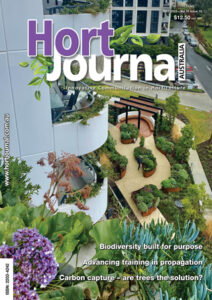A long view of the future
For the first time in fifteen years I missed the Melbourne International Flower and Garden Show (MIFGS), except for lockdowns and cancellations due to COVID19. Unfortunately, I had to suffer ten days of near perfect diving conditions on the coral reefs between Lizard Island and Cairns, including the Osprey Reef in the Coral Sea. Tough I know but someone has to keep an eye on the health of the reef. I was heartened to hear that the coral generally is adapting to the climate changes in some areas, and I must say that the corals I saw on this trip looked in better shape than when I was there pre-COVID lockdowns.
MIFGS is always an inspiration for me. Creative designs fitting into, often, small spaces demonstrate there is a garden option for just about every situation. Gardeners have to take a long view, and time in the garden is measured by seasons and not the tick of a clock. A recent article I read outlined the concept of ‘long mindedness’ and compared the so-called long view of future planners to the view of ‘here and now’.
The here and now view is characterised by instant gratification while the long view sees a gratifying result sometime in the distant future. The long view shows how the natural world has gradually changed and motivates us to attempt change for the better. I heard someone comment on the decline of insects, which is well documented, and the simple measure used was how many insects were splattered on the front of their car after they had driven some distance. Not very scientific considering the aerodynamics of some modern cars but thought-provoking nonetheless. A book titled ‘Alien Worlds’ by Steve Nichols, asserts that insect numbers have reduced by a factor of ten in less than one generation.
Opposition to electric vehicles and energy efficient building design are examples of a short view based on the costs here and now, and not factoring in the savings in running or operating costs over the life of the car or house. Fortunately, and increasingly, many of us are considering the future for future generations. The uptake of solar panels in Australia is the highest in the world according to statistics from the federal Department of Climate Change, Energy, the Environment and Water. As of January 2022, more than three million rooftop PV solar systems have been installed across Australia. Interestingly though when it comes to electric vehicles, the uptake in Australia is well behind Europe but just ahead of Japan and India, and historically Australians are early adopters of new technology so we need to make up for lost ground.
On a positive note, further scientific research on indoor plants has been conducted, by the University of Technology, Sydney, and Ambius Indoor Plants. From what we have been told, the findings are exciting. Stay tuned, as information will be forthcoming. From an industry perspective this information is invaluable. To have scientific research backing up why more people should include plants in every aspect of their lives, from the home to the workplace, and in the carpark is invaluable. You can’t get better marketing material than that!
I look forward to hearing more.
Karen Smith and your Hort Journal Team

